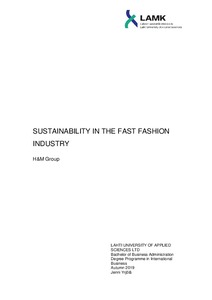SUSTAINABILITY IN THE FAST FASHION INDUSTRY, H&M Group
Yrjölä, Jenni (2019)
Lataukset:
Yrjölä, Jenni
2019
All rights reserved. This publication is copyrighted. You may download, display and print it for Your own personal use. Commercial use is prohibited.
Julkaisun pysyvä osoite on
https://urn.fi/URN:NBN:fi:amk-2019120925422
https://urn.fi/URN:NBN:fi:amk-2019120925422
Tiivistelmä
The clothing industry has never been so large in value than it is in the 21st century. The clothing industry reached a bit over three trillion dollars in 2018, which is two percent of the world’s overall Gross Domestic Product. This is part of the reason why the environmental and social concerns have been increasing during the past years and it is known as “sustainable fashion”, which is a relatively new concept. Sustainability means ecological, cultural and social diversity.
This thesis is about how one of the biggest clothing retailers has worked with their sustainability in the fashion industry. H&M Group has promised to challenge themselves to make more sustainable choices concerning producing their clothes and being the leader of the fast-fashion industry. One of those actions is garment recycling and this thesis discusses the impacts of fast fashion, how the garment recycling works at H&M Group and what sustainability plans Hennes & Mauritz has for the future.
The objective of the thesis is to answer the research questions concerning sustainability in the fast fashion industry, consumers impact towards it and does the second largest fast fashion company H&M encourage its customers to become more sustainable. The primary data was collected through online survey that was shared through author’s social media and at workplace. The secondary data was collected from written and electronic sources. The research method was based on qualitative research to understand the different views and perceptions. The results show, that there is a need for fast fashion companies to become more sustainable, not just for the consumers point of view but also for the environmental point of view.
This thesis is about how one of the biggest clothing retailers has worked with their sustainability in the fashion industry. H&M Group has promised to challenge themselves to make more sustainable choices concerning producing their clothes and being the leader of the fast-fashion industry. One of those actions is garment recycling and this thesis discusses the impacts of fast fashion, how the garment recycling works at H&M Group and what sustainability plans Hennes & Mauritz has for the future.
The objective of the thesis is to answer the research questions concerning sustainability in the fast fashion industry, consumers impact towards it and does the second largest fast fashion company H&M encourage its customers to become more sustainable. The primary data was collected through online survey that was shared through author’s social media and at workplace. The secondary data was collected from written and electronic sources. The research method was based on qualitative research to understand the different views and perceptions. The results show, that there is a need for fast fashion companies to become more sustainable, not just for the consumers point of view but also for the environmental point of view.
